As Trump campaign volunteers Rachel and Chris Gottberg prepared to knock on doors in York, Pennsylvania last month, their goal was to win over the infrequent voters that the campaign sees as key to victory in the battleground state.
Wearing red t-shirts emblazoned with "Trump Force Captain," they were among a handful of door knockers who had gathered in the Republican Party headquarters in this working-class city of about 45,000. They planned to take along their eight-month-old baby in a pram.
The couple said they were focused on newly registered voters and what political campaigns call "low propensity" voters - people who don't show up every voting cycle and may even skip the presidential ballot every four years.
The Trump campaign and its allies are putting an unprecedented focus on targeting these infrequent voters in the seven battleground states that could decide the November 5th election against Democrat Kamala Harris, according to interviews with three dozen Trump campaign staffers, grassroots groups allied to the campaign, Republican county party chairs, donors and a previously unreported donor call.
High-risk strategy
This focus, which has not been previously reported in detail, is a high-risk, labour-intensive strategy that could bring in a wave of new voters but could also fall short if their targets ultimately stay home, one Republican official and one academic expert warned.
"It's definitely a new focus that wasn't the case in 2020," Rachel Gottberg, 34, a door-knocking veteran of previous campaigns, told Reuters before heading off with her husband to hunt for voters in their car adorned with a large Trump campaign hood cover.
Candidates typically target both infrequent voters and swing voters in an effort to expand beyond their base. But Mr Trump, more than in previous cycles, sees infrequent voters as critical. The target voters are largely rural, white and young, but also include a sizeable contingent of people of colour.
"We know they agree with us. We know they favour us, but we have to get them to the polls," James Blair, the Trump campaign's political director, told Reuters.
A New York Times/Siena College survey published on Sunday underscored the opportunity for the Trump campaign with less reliable voters. While Mr Trump held a slight lead on Ms Harris among all likely voters polled, 48 per cent to 47 per cent, he was ahead of her by 9 percentage points, 49 per cent to 40 per cent, among those who did not vote in 2020, according to the poll.
The Trump campaign and its allies see turning out staunch supporters who are less inclined to go to the polls as critical to victory. The campaign is also targeting independents and other persuadable voters, a group they estimate to be 11 per cent of the electorate in the battleground states.
"When you break down the numbers, you realise there's 300,000 low-propensity, conservative-leaning votes in Arizona alone," said Andrew Kolvet, a spokesperson for Turning Point Action, a pro-Trump group helping to mobilise these voters.
When "you're losing these states by 10,000 ballots or 20,000 ballots, you realise just how much potential there is if we do the work of engaging these voters beforehand," he added.
In contrast, the Harris campaign, flush with cash, appears to be mounting a broader-based effort for votes. While campaign officials declined to discuss their granular targeting, the approach appears to include courting women and other groups not committed to Mr Trump with rallies and registration drives.
Jason Cabel Roe, a former executive director of the Michigan Republican Party, said the Trump campaign was smart to go after infrequent voters, who were credited with helping Mr Trump win in 2016.
"A hallmark of Trump support is low-propensity voters that really didn't engage," he said.
Changing makeup of Trump coalition
The campaign is benefiting from the help of at least four pro-Trump organisations that are specifically focused on lower-frequency voters, Reuters found.
These include America PAC - a super PAC backed by tech billionaire Elon Musk - and Turning Point Action, a non-profit led by right-wing activist Charlie Kirk that is planning to spend $108 million to hire hundreds of paid door knockers in battleground states.
Not everyone involved in Mr Trump's get-out-the-vote efforts thinks the intense focus on infrequent voters is a good idea.
One party official in a battleground state, briefed on the ground game strategy, said they were concerned that too many resources were being focused on voters who don't vote often at the expense of swing voters, who don't have a particular allegiance to one party and are easier to get to the polls.
The official, who asked to remain anonymous to discuss internal plans, said that infrequent voters require large investments of time to get them to the polls, including multiple visits to their homes and phone calls. They may not feel invested politically and may not tune into TV ads.
Donald Green, a political science professor at Columbia University, said Mr Trump's strategy is supported by academic research showing that efforts to mobilise infrequent supporters can be relatively effective in presidential years, when those voters are more open to being coaxed. But he also sees risks in the approach.
"The question is whether they're doing their work efficiently. If they're going to the same places and contacting the same people, that's a waste of resources," he said.
The Trump campaign's Mr Blair said it is not ignoring swing or regular voters, who were still being targeted with mail, text messages, and door knocks, but that the voters "hardest to turn out" were getting the most personal attention.
The Republican Party and allied outside groups are also investing heavily to register new voters and to encourage mail-in voting, long a weak point for the party.
Iowa model goes national
The Trump campaign is modelling its general election strategy on the one it employed in the Iowa Republican nominating contest last January, when an army of volunteer captains organised their neighbourhoods and helped
Mr Trump win with 51 per cent of the votes.
The campaign is working to train 50,000 captains like the Gottbergs in Pennsylvania, who said they had already knocked on 250 doors this election cycle.
Unlike past campaigns, these volunteers are not asked to cast a wide net. To start, they are given a narrow list of people in their neighbourhood and asked to build a relationship with them through visits, calls, and post cards. By some measures, the Democrats appear to be building out a more robust get-out-the-vote machine.
For example, Ms Harris' campaign says it has 1,600 paid staff across the battleground states, compared to the "hundreds" Mr Trump's campaign has disclosed. In Pennsylvania, her campaign says they have 50 offices, double Mr Trump's disclosed footprint.
Mr Blair stressed that the Trump campaign was not at a disadvantage.
Mr Trump is leaning heavily on outside organisations to boost turnout following new federal guidelines adopted this year that paved the way for campaigns to exchange data and coordinate more closely with them. Including such groups, there are 2,000 paid canvassers in the field, a Trump campaign official said on condition of anonymity, adding that there was a plan to canvass 15 million doors by Election Day.
Reuters spoke to a dozen Republican county chairs, and all but one said that the Republican get-out-the-vote effort was robust in their area.
The outlier was Dave Smith in Pima, Arizona's second-most populous county, who said Democrats outnumber pro-Trump forces in his area, and he has asked Turning Point Action for more canvassers.
"They say, 'It's coming. Take a chill pill, bro.' I'm like the old guy nagging the youngsters," Mr Smith said.
Mr Kolvet dismissed any suggestion of problems in Pima and said more canvassers were indeed being trained.

In a closed-door pitch to donors in late July, Turning Point's Mr Kirk said Democrats were beating them at the ground game and that he thought Ms Harris was the slight favourite to win, according to a recording of the Zoom talk shared with Reuters.
Asked to comment on the call, Mr Kolvet said Mr Kirk always wants to guard against complacency and likes to play "like we're 10 points down" in the polls.
In the talk, which has not been previously reported, Mr Kirk encouraged donors to fund his group.
"It's going to come down to political trench warfare ... Who can find those extra 10,000 low-prop people and get them into the system?" Mr Kirk said on the call.







